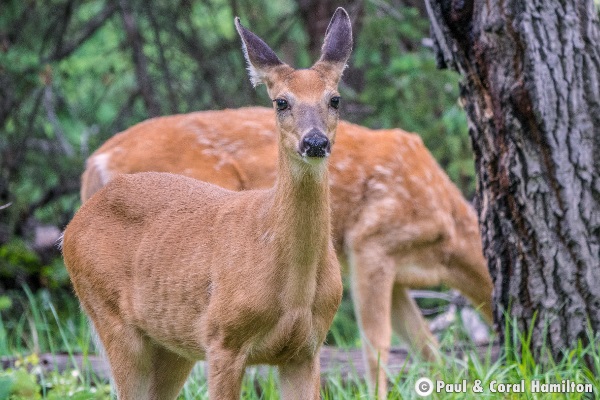(Odocoileus virginianus) WHITETAIL DEER
How large is Jasper Alberta's Whitetail Deer?
- Mass: 57 to 95 kg
Length: to 7 ft. (2.1 m) - Wildlife living area: temperate forest & rainforest, temperate grassland, chaparral, desert, tropical deciduous forest, tropical scrub forest
Status: no special status.
Range: Whitetail deer inhabit most of southern Canada and all of the mainland United States except two or three states in the west. Their range reaches throughout Central America to Bolivia. - The Whitetail deer's bodily coloration differs in shading locally, seasonally, and among subspecies; however in general it is grayer in the winter and redder in the summer. White fur is located in a band behind the nose, in circles around the eyes, inside the ears, over the chin and throat, on the upper insides of the legs and beneath the tail.Males possess antlers which are shed from January to March and grow out again in April or May, losing their velvet in August or September. Antlers do not branch (as in the mule deer) but arise on a single shaft.
Where do Whitetail Deer Live?
Beautiful Jasper Whitetail Deer Fawns and Young Bucks in early August

White-Tailed Deer Making First Tracks on a New Beautiful Blanket
A peaceful few minutes with a healthy white-tailed deer making first tracks on a new blanket of snow in this old growth forest. A talkative Raven fills the background with his unique vocal abilities.
White-Tailed Deer Family
The white-tailed deer (Odocoileus virginianus) is a medium-sized deer that is widely distributed east of the Rocky Mountains. This beautiful white-tailed deer Family whispered towards us while Elk were on our opposite side. White-tailed deer are typically very cautious and aware of their surroundings as you can see here, and any moments with white-tailed deer are always very quiet and peaceful.
Details on Jasper's Whitetail Deer
Whitetail deer are able to survive in a variety of terrestrial habitats, from the big woods of northern Maine to the deep saw grass and hammock swamps of Florida. They also inhabit farmlands, brushy areas and such desolate areas of the west such as the cactus and thornbrush deserts of southern Texas and Mexico. Ideal whitetail deer habitat would contain dense thickets (in which to hide and move about) and edges (which furnish food).
Tracks are 2 - 3 in. (5 - 8 cm.) long. Dew claws are evident in snow, mud or soft soil, and when running.

Whitetail Deer Tracks
